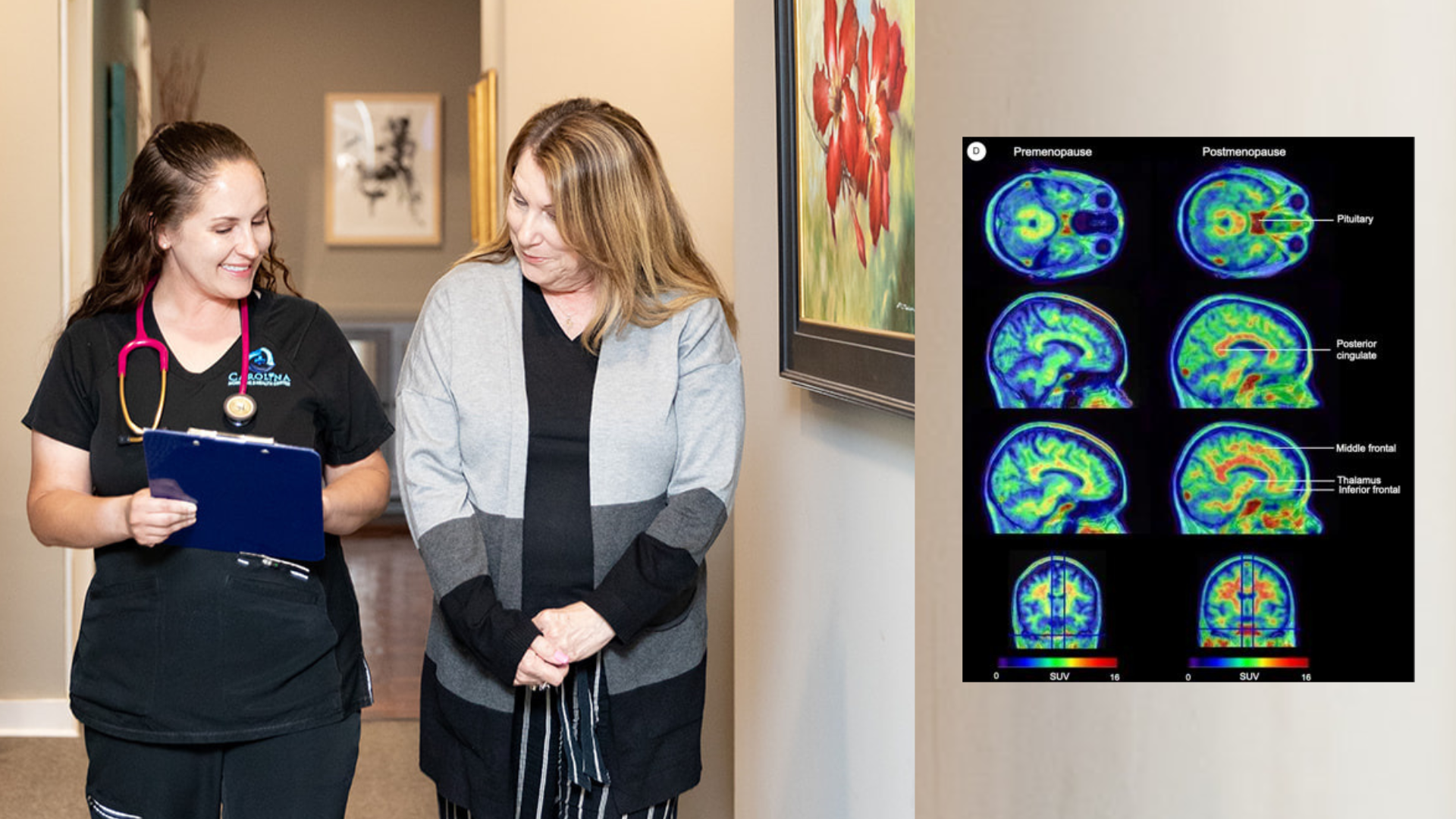Picture this: you’re at work, trying to focus on an upcoming project, but your mind keeps drifting. You feel distracted, forgetful, and overwhelmed. You can’t seem to get over the hurdle of remembering your idea or getting it onto paper.
Or imagine this: you are juggling the schedules of your children and grandchildren, all the while forgetting where you put your car keys, what you were supposed to add to your day planner, and who you said you would “call right back”.
Does this sound painfully familiar? If it does, you’re not alone. Many women experience brain fog during menopause, a phase marked by significant hormonal shifts. The primary culprit is estrogen, a hormone that plays a critical role in brain health. As estrogen levels fluctuate and eventually decline, your brain’s cognitive functions can become compromised, leading to those frustrating moments of mental fog.
Dr. Lisa Mosconi’s research reveals that this isn’t just about temporary lapses in concentration. Estrogen impacts neurotransmitters and neural processes that are vital for memory and mental clarity. When estrogen levels drop, it affects how well your brain adapts and reorganizes itself, leading to reduced cognitive function. This can result in the very symptoms of brain fog you’re experiencing.
Understanding The Science
What if you could actually see what’s happening in your brain during these foggy moments? Dr. Mosconi uses specialized tracers in positron emission tomography (PET) scans to measure how estrogen binds to receptors in the brain. This study resulted in two major points: it is possible to measure estrogen in the brain and there are changes that happen in the brain during menopause.
1. Measuring Functionality and Biochemistry
These tracers allow scientists to visualize and quantify how estrogen interacts with brain receptors. By examining these interactions, researchers can see how fluctuations in estrogen impact cognitive functions. Reduced binding of estrogen in crucial brain areas can directly correlate with symptoms of brain fog.
2. Understanding Binding Patterns
Tracers help map out where estrogen receptors are located and how their density changes with hormonal shifts. Estrogen significantly influences areas like the following:
- hippocampus and amygdala – memory, concentration, and emotion
- hypothalamus – hot flashes
Lower receptor binding in these areas can help explain why menopause can lead to memory lapses and difficulty focusing. The study found that post-menopausal women had nearly 30% more estrogen receptors in their brains than pre-menopausal women. More receptors = more need for estrogen for the brain to function properly.
You are not just “losing your mind”, “going crazy”, or “grumpy”. Your brain is looking for something specific (estrogen), and you must help it find what it needs.
Introducing Dr. Lisa Mosconi
Dr. Lisa Mosconi, a prominent neuroscientist and author of The Menopause Brain, has conducted studies on these specific problems to help women around the world understand that they can live life again at a high level. Her most recent published study in Scientific Reports suggests that the decline in estrogen during menopause may not only cause temporary cognitive disruptions but could also increase the risk of more serious conditions like Alzheimer’s disease.
Estrogen plays a protective role in brain health, and its reduction may accelerate the onset of cognitive decline. By understanding how hormonal changes affect brain function, researchers like Dr. Mosconi are uncovering potential pathways that link menopause to increased Alzheimer’s risk. This connection highlights the importance of managing hormonal changes and maintaining cognitive health to potentially mitigate long-term risks.
Practical Strategies to Clear brain fog
At Carolina Hormone and Health Center, our goal for our team is to help you feel better again with Bioidentical Hormone Replacement Therapy. Once this begins to happen, we can help you focus on areas like hydration, movement, nutrition, and peace to maximize your benefits of hormone optimization.
1. Bioidentical Hormone Replacement Therapy
We treat each individual with the focus needed to merge what we learn from your story, consultation, bloodwork, and clinical evaluation before you begin therapy.
2. Hydration
Did you know your body needs an average of 64 ounces of water daily for your cells to function at their base level? If not, your organs and skin may feel withered, sluggish, or tired. To fully hydrate, you would need to drink about a gallon of water every day. However, if have been feeling sick, tired, or stressed, a Nutritional IV may be the jumpstart you need to hydrate and absorb 90-100% of the vitamins and minerals in it.
3. Movement
Regular exercise is not only good for your body but also for your brain. It enhances blood flow and promotes the release of neurotransmitters that can improve mental clarity. Get out and walk the Ravenel Bridge or around Lake Murray or grab a friend and check out a local gym or pilates studio. If you are able, we suggest adding strength training or weight lifting into your routine. This will help break down the muscles for growth, and will prohibit your brain from thinking they are food (more to come on this).
Your body (and brain) will thank you!
4. Nutrition
Your brain needs to eat, and the best thing for it is protein. The average female should be intaking .7 grams of protein for every pound of her weight, and the average male should be intaking 1 gram of protein for every pound of his weight. If you are trying to lose weight, you can multiply the .7g or 1g by your goal weight in pounds. Click here to download our Protein Cheat Sheet.
If you don’t provide your brain with the needed protein to grow, it will start to eat the sugar in your body first, then the muscle. If you are breaking down your muscles each day with weight lifting, your brain will bypass that and begin eating fat.
5. Peace
Last, but certainly not least, is peace. There are two primary factors we focus on for peace: stress and sleep. Stress can push the brain into overdrive causing restlessness, anxiety, food cravings, and fatigue. By starting your morning gratitude journaling, praying, or meditating, you can help regulate your stress levels at the beginning of the day.
Quality sleep is essential for peace, cognitive function, and overall well-being. By optimizing your hormones, you will begin to regulate your sleep. Many of our patients take compounded progesterone at night to help with sleep. We also highly recommend magnesium supplements, such as Magnesium Glycinate or MagSoothe to help with sleep quality. Not all magnesium supplements are created equal, so ensure you are getting yours from a quality healthcare provider.
The Best is yet to come
Menopause can bring about significant changes in both the body and the brain, but understanding and addressing these dysregulations can make a world of difference.
By implementing these strategies, you can navigate the challenges of menopause with greater confidence and regain the life you’re seeking. The journey through menopause doesn’t have to be ambiguous, taboo, or confusing. With the right education and healthcare team, you can clear the mental haze and embrace a more vibrant, focused you.
Book a complimentary consultation today with our Patient Advocate to begin your journey towards optimized hormones and vitality. More information about our consultations can be found in the FAQs.




